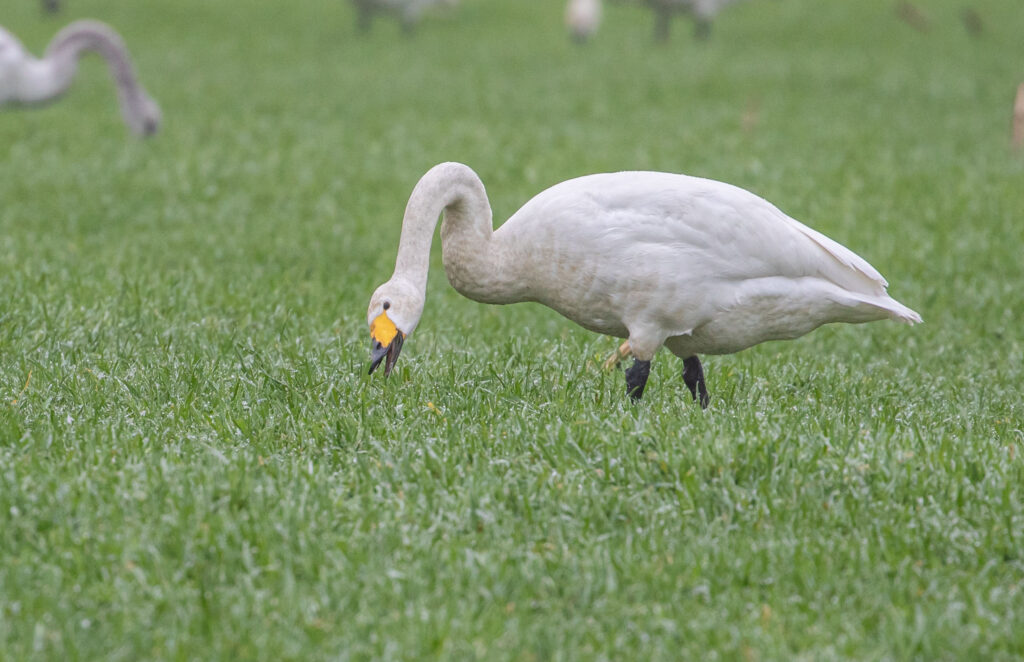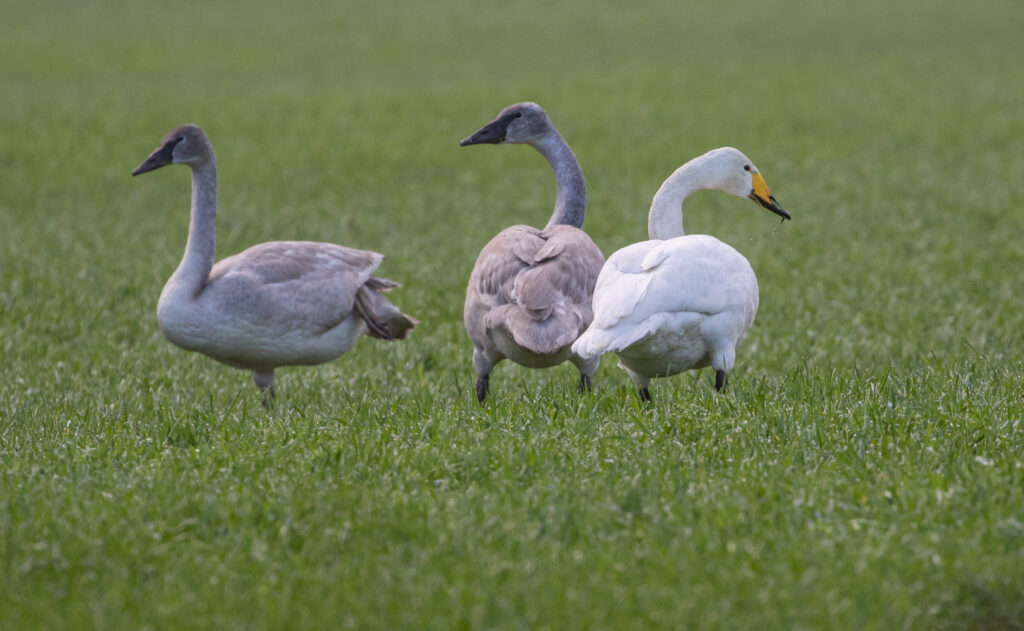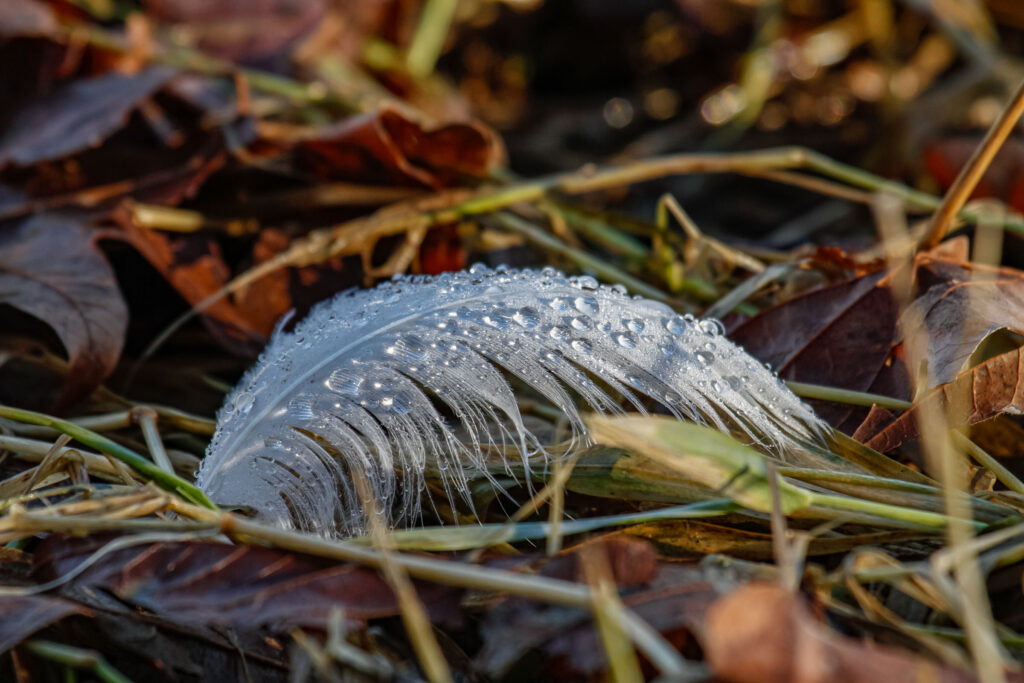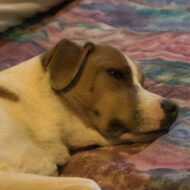This week I pondered a recent Precision Nutrition lesson about common cognitive distortions. These are inaccurate, negatively biased, habitual ways of thinking. On a birding trip to Monroe this morning, I reflected on three I used today. Herein I describe my efforts to overcome four cognitive distortions against the backdrop of the rare, beautiful Whooper Swan.

A Birding Outing to Monroe, WA
My husband, a friend, and I drove to Monroe early this morning. Our mission was to locate and photograph the rare Whooper Swan, the Eurasian counterpart to the North American trumpeter swan. We pulled up at the edge of one of the fields it had visited the day before. There, on the edge of a large flock of white fowl, stood the yellow-beaked Whooper Swan, feasting on grass. Chasing rarities doesn’t get any easier.
Both my husband and friend completed the Seattle Audubon Master Birder program several years ago. I joke that I’ve developed my birding knowledge “via osmosis.” While I appreciate birds, my first love remains mammals, evident from my volunteer time at the Woodland Park Zoo.
When our friend asked me if I’d ever seen a Townsend’s solitaire on any of my hikes, I told her, “I’d have to check my ebird list.” The Whooper Swan makes world bird species number 543 since I started keeping track twelve years ago. But I have a sucky birding memory. Enter Cognitive Distortions.

Common Cognitive Distortions
I joined them on this outing partly to expand my mental and cognitive resilience. (What, wasn’t it for fun? Partly.) Aware that my list of to-do’s back home was getting long, I wanted to address several cognitive distortions:
- Binary Thinking — either/or, all/nothing, black/white. I could either go birding or stay home and tackle my to-do list. Birding was a way for me to remind my brain about that nifty little word, and. Perhaps I could bird AND get my workout in, write my blog, finish eight pages of fiction…
- Negative Mental Filter — seeing a rare bird would be a huge unexpected, unplanned-for experience, and would give me social time with my husband and friend. I’d be out in fresh air, taking cool photographs, and doing something new. I wanted to enjoy the positives and try to ignore that one nasty negative (not getting everything done on my list)…
- Labeling — as in, “I have a sucky birding memory.” No, I’m an advanced beginner birder. Which is perfectly fine. Or better, I remember whatever I pay attention to. Perhaps I just need more time birding.
- Shoulding All Over Yourself — ignoring the “You should do your strength workout; you should stay and write your blog post; you should get that piece to your readers so they have enough time.” What I wanted was to see swans. I love swans, geese, and ducks.

Overcoming Cognitive Distortions Takes Vigilance
As we took our last photos and returned to the car, I congratulated myself for getting out of the house and going on an adventure. I’d embraced the beginner’s mind (see January’s post) knowing that both my birding partners have far more knowledge and experience than I do.
Everything was great… until my friend offered to take me birding sometime. Before I could think, I heard the automatic words come out of my mouth. “Oh no, I’m not very good at it.” Aack! And I had been trying so hard! Will I be a WIP (Work In Progress) for the rest of my life?
Instead of saying “I failed!” I had to laugh. How much vigilance do I need to change them? Especially when I’ve been using them for decades. Tapping into my infantile growth mindset (and my friend’s kind words) I realized SHE offered to take ME. She wanted to pay it forward by teaching what she knows. I could accept her generous offer and have fun birding with someone new. Get a different perspective. She’d have company, I’d get more adventure. Win-win.

Overcoming Cognitive Distortions Takes Planning
I plan to move forward by taking the following steps:
- Sharing my intentions with family members who can help me spot the cognitive distortions I’m using;
- Noticing and Naming whenever I’m using one, so I bring increased awareness to my brain;
- Writing them down, crossing out the distorted “untruth” and writing a “better truth” or “true truth”;
- Celebrating whenever I stop mid-stream to check what’s coming out of my mouth. Becoming conscious.
Perhaps in doing so, not only can I change my brain’s programming, but I can also model how to overcome cognitive distortions for my colleagues, writing partners, clients, and daughter. In this way, I’m moving from “consciously incompetent” toward “consciously competent.” How about you?



Yes, so many ways we have learned and perfected over the years to self-sabotage and self-limit; no wonder we are the superior species 😊! While I am somewhat relieved (for just a millisecond) that it is not just me, I am still concerned about how many doors I have closed for myself… and still do. This post is a well-timed invitation to pay attention to these learned habits and their sometimes insidious impact. You refer to the cognitive distortions as “… HABITUAL ways of thinking” and that rings a myriad of interconnected bells for me. I’ll want to focus on that aspects (habits) in my reply, not dismissing the other powerful points you make about binary thinking, labeling, and “shoulding”. So much of what I do, the way I live my life, is directed by habits; many of these formed a long time ago, few of them questioned as to their current relevancy and, more importantly, their usefulness in fulfilling some of my most precious aspirations/dreams. I like to think about it as “living my life in auto-pilot”, which might be good if I were an airplane… not as an individual wanting to “make the best out of the life I have left”. The stakes are pretty high here, and actively identifying these cognitive distortions to then reorient ourselves in function of our goals becomes paramount. I particularly like your line about “Noticing and Naming whenever I’m using one, so I bring increased awareness to my brain” in that context. I have also tried to become more vigilant about my decision making process; I aim for real-time assessment but am perfectly happy to analyze a bit after the fact so I’ll be better prepared the next time around. I don’t want to “beat myself up” if I acted in a very Pavlovian manner (stimulus A? Sure, action B!) but I want to learn and open a small window between A and B. When I just act out of habit, it really feels that I (whoever “I” is) was NOT PRESENT at all when the decision was made… in very much the same way it would feel if someone else had made the decision for me. With practice, it does get slowly better and successes must be celebrated; as you put it: “Celebrating whenever I stop mid-stream to check what’s coming out of my mouth . Becoming conscious.” Absolutely! With the countless decisions we make every day, being vigilant about them all would be a full time job… but maybe paying attention to a few important ones (we feel the importance I believe), is good enough… yes, KISAGE again here. Slowly, one decision dissection at a time, I can maybe create a new mental habit to… check and validate my mental habits as they are called to action. I will end with my favorite part of the post, when you say, regarding your reaction to your friend’s offer: “Instead of saying “I failed!” I had to laugh”. Laughing, not to deride, not to judge, but to in fact love the fact that we are imperfect and aware of it; that we are (thankfully) always WIP. it reminds us of all there is still so much to learn, explore, play with, and marvel at.
Gerard, I have made you my unofficial “guest blogger” at least in my own mind. Well done as always.
One of the things I love about your comments is tying into previous ones — KISAGE, for example — and I think you will appreciate when I post Thursday how I reference what has come before. I had additional opportunities this weekend — this morning, this afternoon included — to call out still more of the cognitive distortions I did not reference in this week’s post. Gad. I must be using them ALL, nearly all the time. But instead of being unconsciously unaware (or as it goes, unconsciously incompetent) I am shifting to CONSCIOUSLY incompetent (or aware) and watching from a moderate, safe distance exactly how my brain gets me into trouble. It’s utterly fascinating.
I find if I can maintain that arms-distance view, it doesn’t sting quite as much; instead, it raises curiosity as to WHY. WHY does my brain construct THAT story when those around me remember the details quite differently? In short, our BRAINS ARE TRYING TO PROTECT US (just as our bad habits do) in some way. So our homework involves (as you call out) Noticing and Naming, and then with self-compassionate curiosity, ACCEPTING that we’re doing the best we can, then CHOOSING to act differently, to reprogram our brains for a better pathway. I don’t have an acronym for it yet (laughing) — NANAC? rings of “nanny nanny boo boo” but not quite — but I am on this journey with you! And I will end my response with a follow-up that I have accepted my friend’s invitation to bird together in March — I showed her the post and she loved it — may we all be WIP’s together, one day at a time, to more honest, conscious, striving selves. Onward, upward, forward!
OMG, I love that photo of the feather! Your message in this blog reminds me of always saying, “I need to do…..” this or that. When I was still working I had on my bulletin board at my desk a message to myself, in a place where my eye would usually go… “I want to do….” a task, write that policy, or whatever. While I am now retired I certainly still have tasks that I need/want to complete. I haven’t completely changed my mind thought but at least now I can catch myself and laugh at myself when I say that I “need” to do something rather than saying that I “want” to do something.
Thanks, Yvonne! I actually had a snapshot of that feather in my brain — funny how certain images and moments get seared into our minds — and had to dig through several years’ worth to locate it to share. That “should” distortion is so prevalent — I was reminded of it when a client quoted me back to myself using “don’t should all over yourself.” If we WANT and CHOOSE to do something it’s so much more compelling than “gotta”, “have to” or “should.” We’re all about choices. Appreciate the comment!
WOW…if someone would offer me to go birding with him or her, my first thought would be “this is not my cup of tea”, I am not good at it…I would find all kind of reasons for not going…as we age we tend to not try “new activities”, we are less adventurous…I think that doing something new can bring a new passion to our life. Or we can be curious and it is good enough. It is fun. Not everything can turn to a passion. I love just “good enough”. 🤔 Great read!
Thanks for your post, Silvie-Marie! Yes, it is very common to forget the beginner’s mindset when we’re facing something brand new — where on earth do we get the expectation that we should be perfect at everything we try? That’s a “fixed mindset.” By getting out of our comfort zone and trying something new, we can learn something we might not have before — ten years ago if I had said “I’ve been taking photos since I was a teenager, I can’t possibly learn anything else” I would have missed out on an entire decade of trying, exploring, learning. Great fun. Likewise, I just started learning about amphibians, of which I know next to nothing, but I am determined to get one shot of a Pacific Tree Frog before the end of my six-month stint. I dare you, readers: find something you’ve never done before and give it a try. You may find something you really enjoy! I did, with my blog, seven months ago. And now? I’m hooked!
Ironically, minutes after I posted this, I found myself using one of the OTHER cognitive distortions that I did not write about. Oh boy, it’s going to be a LO-O-ONG process reprogramming this brain! Join the fun!